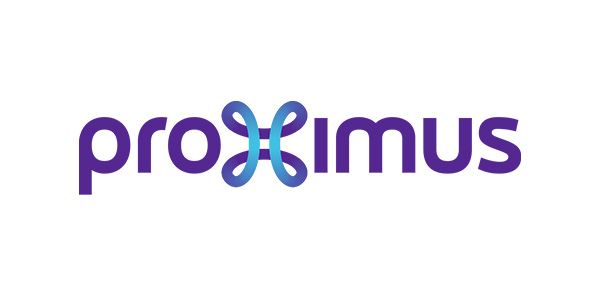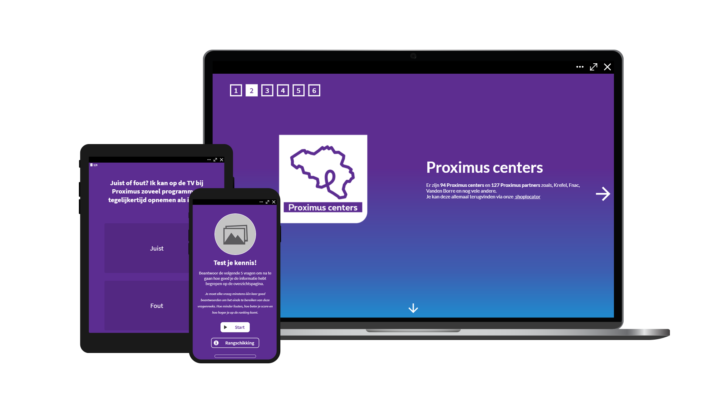A huge acceleration thanks to FLOWSPARKS
The FLOWSPARKS AI-feature considerably reduces the barrier to creating your own digital modules, because you no longer start from a blank page. Furthermore, the time savings are enormous.


Jan Neels has been working for over fourteen years as a digital learning specialist at Proximus, and he has seen training and education change fundamentally in that time. The biggest change now is the birth of AI. FLOWSPARKS launches the co-author feature. It’s an AI feature, based on the language model behind ChatGPT, which allows authors to generate content in FLOWSPARKS in just a few clicks. ‘The numerous templates within FLOWSPARKS are already a great help to authors who don’t have a didactic background but who still want to build interactive content. The AI feature takes that a step further and helps authors who have momentarily run out of inspiration to get started, by providing a first draft of a filled-in template,’ explains Christophe Jacobs, Chief Customer Success Officer at FLOWSPARKS.
When you know that Proximus provided approximately 311,000 training hours for its 13,500 employees in 2018, you get an idea of the challenge that Jan Neels faced. In 2017, when there was an acute need for advanced tests for the certification of helpdesk employees, he had to go in urgent search of a digital solution.
At that time, there were 1,600 operators staffing the helpdesk at Proximus, together handling 13,000 calls a day, and 80% of those operators were external parties. To improve the quality of the helpdesk, Proximus had to increase the knowledge and know-how of the operators and give them a solid base for their work. Now with AI, there are new opportunities to improve our e-Learning courses.
Proximus has already been working with AI since 2022. ‘As soon as it emerged, we began asking ourselves how it would affect our business and what guidance we could give our staff on it,’ says Jan Neels, Digital Learning Specialist at Proximus. ‘Based on my expertise, I was particularly curious about how AI could contribute to our learning culture and learning modules. I could see the benefits of ChatGPT, but I thought it would be even more helpful if the authoring tool generated the content itself, as ChatGPT does.’
‘I called Christophe to discuss my idea with him. He told me that not only had they had the same idea, they were already working on it. To me, that’s typical of FLOWSPARKS: they know exactly what their customers need.’
Proximus was therefore keen to participate in the development of the AI feature and we were first in line to test the pilot version. A large group of 38 organizations signed up for it. About half of them actively participated in developing the feature, which meant it could be validated relatively quickly.
‘It was the first time we had involved customers in development so intensively, and that was quite exciting,’ Christophe admits. ‘Just because we think we have a good idea doesn’t mean our customers are excited about it. The challenges we faced during development, which we usually keep in-house, we now shared with them. We were also very transparent from the outset: We know what we are starting, but we don’t know where we’ll end up.’
Of course, you can still choose to create your own content. But if you want to start filling in the templates using AI, you now have an ‘AI support’ button that will help you to do that. Once you’ve chosen a template, that button will take you to a form where you only have to provide minimal input. You have to enter a subject, and the more precisely you do that, the better the output. You also have the option to define the target audience, tone of voice, the AI assistant’s level of expertise and the learning duration of your digital module. You then select the language in which you want the output to be generated. ‘AI is not smart in itself, and people who have already used ChatGPT know that everything hinges on a good prompt injection,’ Christophe says. ‘The form helps the underlying system to generate a good prompt for the AI language model.’
The more precise the input, the better the output. That’s why FLOWSPARKS gives you the opportunity to add extra information, attachments etc. FLOWSPARKS then creates an impetus for texts and images!

Is it 100% perfect? Definitely not. Humans can certainly do better. But the feature takes three minutes to do what might otherwise take you a couple of hours, and in so doing, FLOWSPARKS is solving the ‘blank page syndrome’, says Christophe. It provides the scaffolding for the author to build on. It’s a big help to content creators, because all the fields behind the template are filled in automatically.
The FLOWSPARKS AI-feature considerably reduces the barrier to creating your own digital modules, because you no longer start from a blank page. Furthermore, the time savings are enormous.
‘A key benefit of the AI feature in FLOWSPARKS is security’, says Jan. ‘Proximus can’t use open source software because obviously we don’t share our data. In FLOWSPARKS alone, we work with 160 content creators. You can’t assume that each of them is equally meticulous about security. FLOWSPARKS realized this and created a secure environment for its customers.’
‘Most of our customers are data-security conscious. We therefore choose to give them the option of sharing their own open AI environment with FLOWSPARKS, so that they can work within our tool, but using their own AI licenses’, Christophe explains.
What does Jan see as the big advantage of the new AI feature, we wonder? ‘Not everyone is equally skilled at creating learning modules. Sometimes you don’t really know where to start. The barrier to creating your own digital modules is now even smaller, because you no longer start from a blank page,’ he says. ‘It also takes less time, of course. I can create a full, well-put-together module in a morning, which I can then deliver to the content owner to be tweaked further.’
‘What I really noticed during the pilot phase is that you are pushed more towards learning’, Jan continues. For example, when you create a SMARTPAGE, people tend to start with an explanation. The AI feature always starts with a question before moving on to the learning content. I now also know that it should be done like that, but I don’t always do it yet. Then the AI feature says to me ‘Hey Jan, start with a question!’
‘Furthermore, I very often start from a THEMEPAGE and then let AI loose on it. It will apply different templates. We create an estimated 80 percent of modules with theme pages and SMARTPAGES which we sometimes add a video to. We rarely use the other templates, but when AI chooses them, you see that they also work much better to achieve the learning goals. It takes an enormous amount of brainpower for us humans to come up with all that ourselves. AI does it in the blink of an eye,’ Jan says.
‘FLOWSPARKS has already offered a lot of support and guidance in creating interactive e-Learning modules. AI now fills in the gaps that were still there, for example, by collecting input, generating text, suggesting images etc. ‘As a result you can get on with focusing on and elaborating on the concrete learning content faster’, Christophe adds. ‘You very quickly have an MVP(Minimum Viable Product) which you can use to solve a learning need. You can easily show customers or colleagues two or three alternatives, from which they can decide what they want and what they are going to develop further.’